Neoliberal Planning: Impact on Indigenous Australians in Australia
VerifiedAdded on 2023/01/23
|10
|2619
|31
Essay
AI Summary
This essay explores the influence of neoliberal planning on Indigenous Australians in Australia. It begins by defining neoliberalism and its emphasis on free-market capitalism, privatization, and deregulation, and then examines how these principles have shaped regional development policies in Australia since the 1980s. The essay highlights the importance of incorporating indigenous perspectives into planning, discussing the recognition of indigenous rights, and the role of the United Nations Declaration on the Rights of Indigenous Peoples (UNDRIP). It examines specific examples of neoliberal planning's impact, such as the development of Aboriginal corporations and social infrastructure, and analyzes how these policies have affected the social, economic, and cultural well-being of Indigenous Australians. The essay also discusses the implications of neoliberal planning, including the shift towards state recognition and the creation of spaces for indigenous self-determination, ultimately assessing the advantages and disadvantages of these policies on the Indigenous communities.
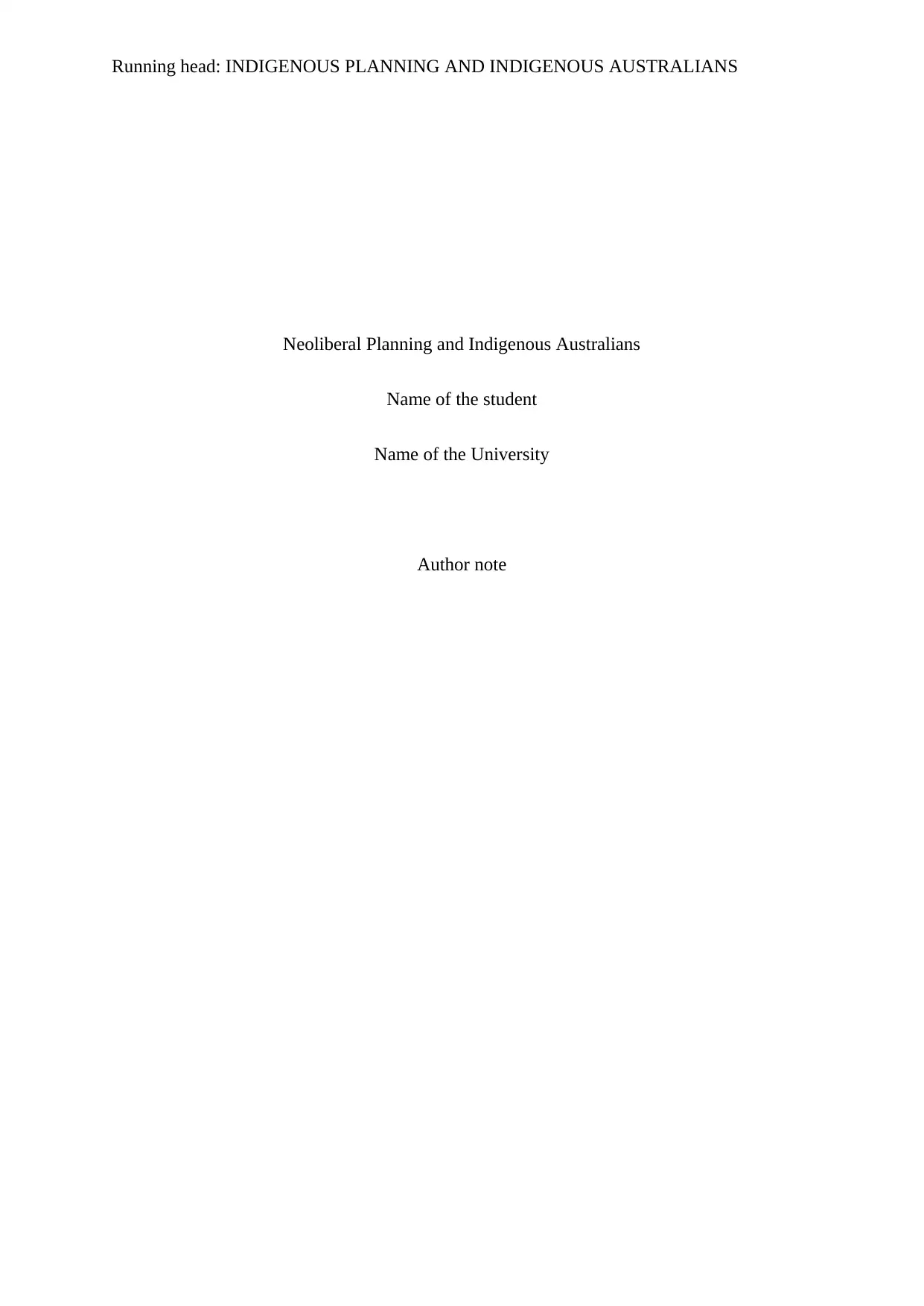
Running head: INDIGENOUS PLANNING AND INDIGENOUS AUSTRALIANS
Neoliberal Planning and Indigenous Australians
Name of the student
Name of the University
Author note
Neoliberal Planning and Indigenous Australians
Name of the student
Name of the University
Author note
Paraphrase This Document
Need a fresh take? Get an instant paraphrase of this document with our AI Paraphraser
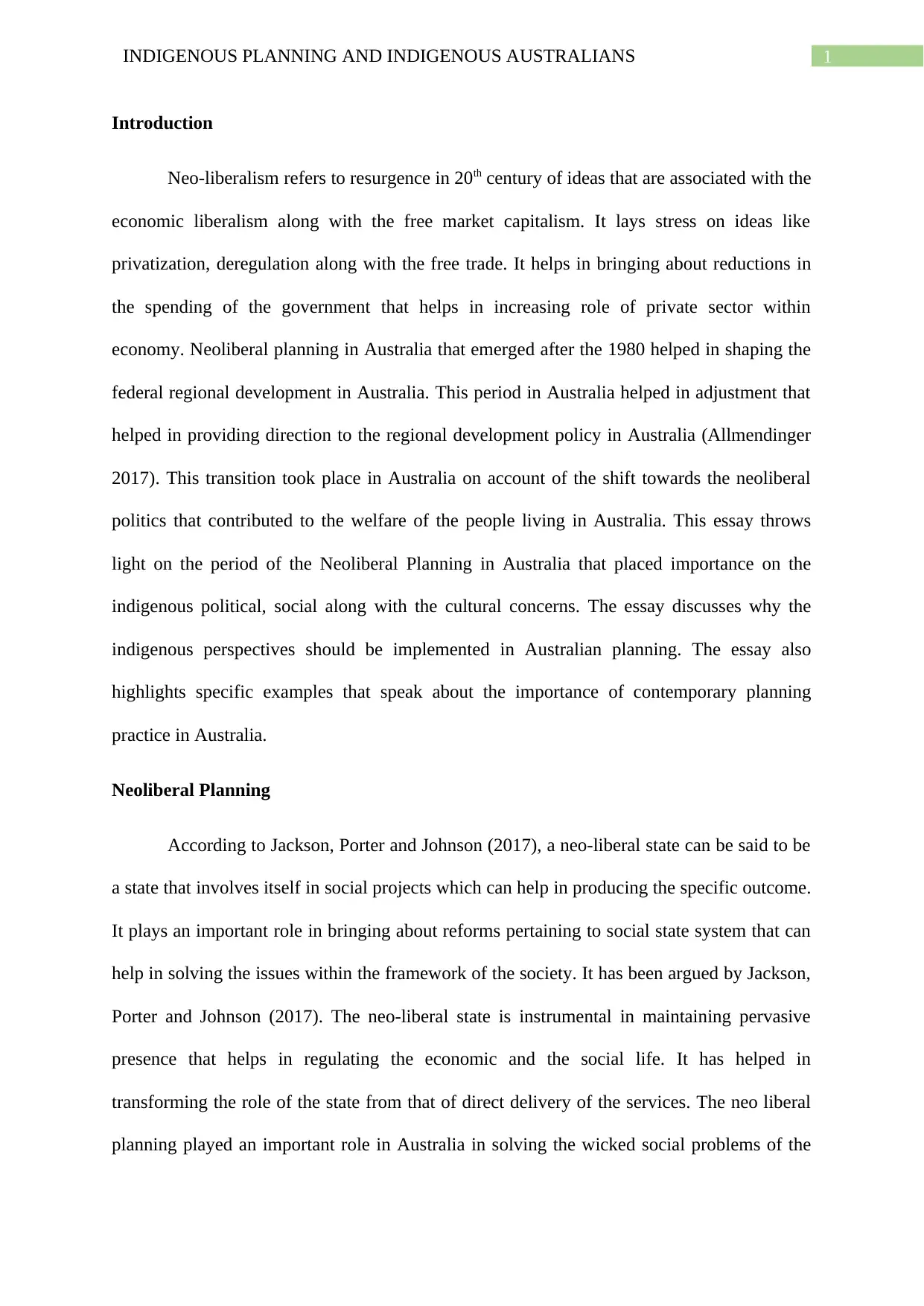
1INDIGENOUS PLANNING AND INDIGENOUS AUSTRALIANS
Introduction
Neo-liberalism refers to resurgence in 20th century of ideas that are associated with the
economic liberalism along with the free market capitalism. It lays stress on ideas like
privatization, deregulation along with the free trade. It helps in bringing about reductions in
the spending of the government that helps in increasing role of private sector within
economy. Neoliberal planning in Australia that emerged after the 1980 helped in shaping the
federal regional development in Australia. This period in Australia helped in adjustment that
helped in providing direction to the regional development policy in Australia (Allmendinger
2017). This transition took place in Australia on account of the shift towards the neoliberal
politics that contributed to the welfare of the people living in Australia. This essay throws
light on the period of the Neoliberal Planning in Australia that placed importance on the
indigenous political, social along with the cultural concerns. The essay discusses why the
indigenous perspectives should be implemented in Australian planning. The essay also
highlights specific examples that speak about the importance of contemporary planning
practice in Australia.
Neoliberal Planning
According to Jackson, Porter and Johnson (2017), a neo-liberal state can be said to be
a state that involves itself in social projects which can help in producing the specific outcome.
It plays an important role in bringing about reforms pertaining to social state system that can
help in solving the issues within the framework of the society. It has been argued by Jackson,
Porter and Johnson (2017). The neo-liberal state is instrumental in maintaining pervasive
presence that helps in regulating the economic and the social life. It has helped in
transforming the role of the state from that of direct delivery of the services. The neo liberal
planning played an important role in Australia in solving the wicked social problems of the
Introduction
Neo-liberalism refers to resurgence in 20th century of ideas that are associated with the
economic liberalism along with the free market capitalism. It lays stress on ideas like
privatization, deregulation along with the free trade. It helps in bringing about reductions in
the spending of the government that helps in increasing role of private sector within
economy. Neoliberal planning in Australia that emerged after the 1980 helped in shaping the
federal regional development in Australia. This period in Australia helped in adjustment that
helped in providing direction to the regional development policy in Australia (Allmendinger
2017). This transition took place in Australia on account of the shift towards the neoliberal
politics that contributed to the welfare of the people living in Australia. This essay throws
light on the period of the Neoliberal Planning in Australia that placed importance on the
indigenous political, social along with the cultural concerns. The essay discusses why the
indigenous perspectives should be implemented in Australian planning. The essay also
highlights specific examples that speak about the importance of contemporary planning
practice in Australia.
Neoliberal Planning
According to Jackson, Porter and Johnson (2017), a neo-liberal state can be said to be
a state that involves itself in social projects which can help in producing the specific outcome.
It plays an important role in bringing about reforms pertaining to social state system that can
help in solving the issues within the framework of the society. It has been argued by Jackson,
Porter and Johnson (2017). The neo-liberal state is instrumental in maintaining pervasive
presence that helps in regulating the economic and the social life. It has helped in
transforming the role of the state from that of direct delivery of the services. The neo liberal
planning played an important role in Australia in solving the wicked social problems of the
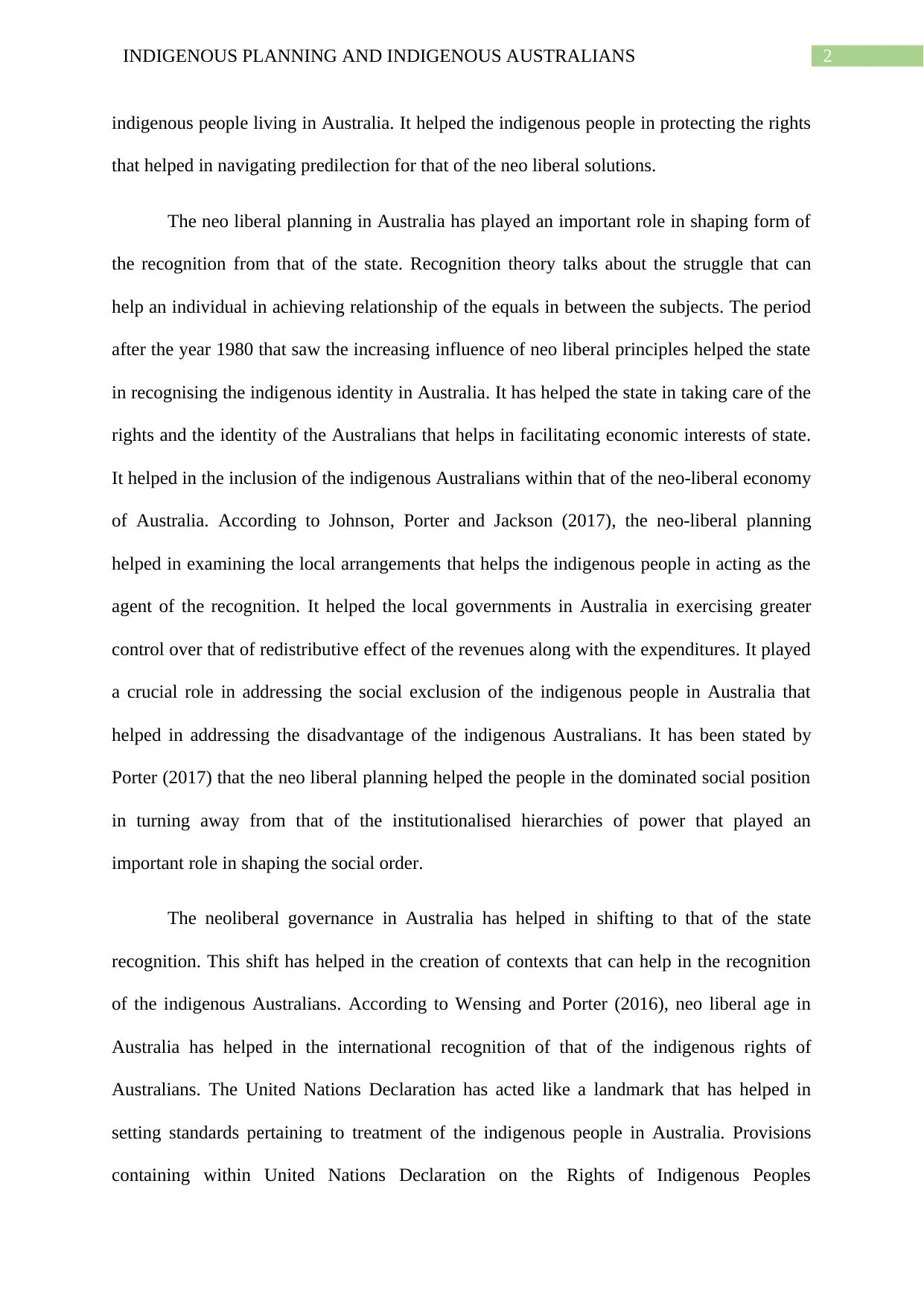
2INDIGENOUS PLANNING AND INDIGENOUS AUSTRALIANS
indigenous people living in Australia. It helped the indigenous people in protecting the rights
that helped in navigating predilection for that of the neo liberal solutions.
The neo liberal planning in Australia has played an important role in shaping form of
the recognition from that of the state. Recognition theory talks about the struggle that can
help an individual in achieving relationship of the equals in between the subjects. The period
after the year 1980 that saw the increasing influence of neo liberal principles helped the state
in recognising the indigenous identity in Australia. It has helped the state in taking care of the
rights and the identity of the Australians that helps in facilitating economic interests of state.
It helped in the inclusion of the indigenous Australians within that of the neo-liberal economy
of Australia. According to Johnson, Porter and Jackson (2017), the neo-liberal planning
helped in examining the local arrangements that helps the indigenous people in acting as the
agent of the recognition. It helped the local governments in Australia in exercising greater
control over that of redistributive effect of the revenues along with the expenditures. It played
a crucial role in addressing the social exclusion of the indigenous people in Australia that
helped in addressing the disadvantage of the indigenous Australians. It has been stated by
Porter (2017) that the neo liberal planning helped the people in the dominated social position
in turning away from that of the institutionalised hierarchies of power that played an
important role in shaping the social order.
The neoliberal governance in Australia has helped in shifting to that of the state
recognition. This shift has helped in the creation of contexts that can help in the recognition
of the indigenous Australians. According to Wensing and Porter (2016), neo liberal age in
Australia has helped in the international recognition of that of the indigenous rights of
Australians. The United Nations Declaration has acted like a landmark that has helped in
setting standards pertaining to treatment of the indigenous people in Australia. Provisions
containing within United Nations Declaration on the Rights of Indigenous Peoples
indigenous people living in Australia. It helped the indigenous people in protecting the rights
that helped in navigating predilection for that of the neo liberal solutions.
The neo liberal planning in Australia has played an important role in shaping form of
the recognition from that of the state. Recognition theory talks about the struggle that can
help an individual in achieving relationship of the equals in between the subjects. The period
after the year 1980 that saw the increasing influence of neo liberal principles helped the state
in recognising the indigenous identity in Australia. It has helped the state in taking care of the
rights and the identity of the Australians that helps in facilitating economic interests of state.
It helped in the inclusion of the indigenous Australians within that of the neo-liberal economy
of Australia. According to Johnson, Porter and Jackson (2017), the neo-liberal planning
helped in examining the local arrangements that helps the indigenous people in acting as the
agent of the recognition. It helped the local governments in Australia in exercising greater
control over that of redistributive effect of the revenues along with the expenditures. It played
a crucial role in addressing the social exclusion of the indigenous people in Australia that
helped in addressing the disadvantage of the indigenous Australians. It has been stated by
Porter (2017) that the neo liberal planning helped the people in the dominated social position
in turning away from that of the institutionalised hierarchies of power that played an
important role in shaping the social order.
The neoliberal governance in Australia has helped in shifting to that of the state
recognition. This shift has helped in the creation of contexts that can help in the recognition
of the indigenous Australians. According to Wensing and Porter (2016), neo liberal age in
Australia has helped in the international recognition of that of the indigenous rights of
Australians. The United Nations Declaration has acted like a landmark that has helped in
setting standards pertaining to treatment of the indigenous people in Australia. Provisions
containing within United Nations Declaration on the Rights of Indigenous Peoples
⊘ This is a preview!⊘
Do you want full access?
Subscribe today to unlock all pages.

Trusted by 1+ million students worldwide
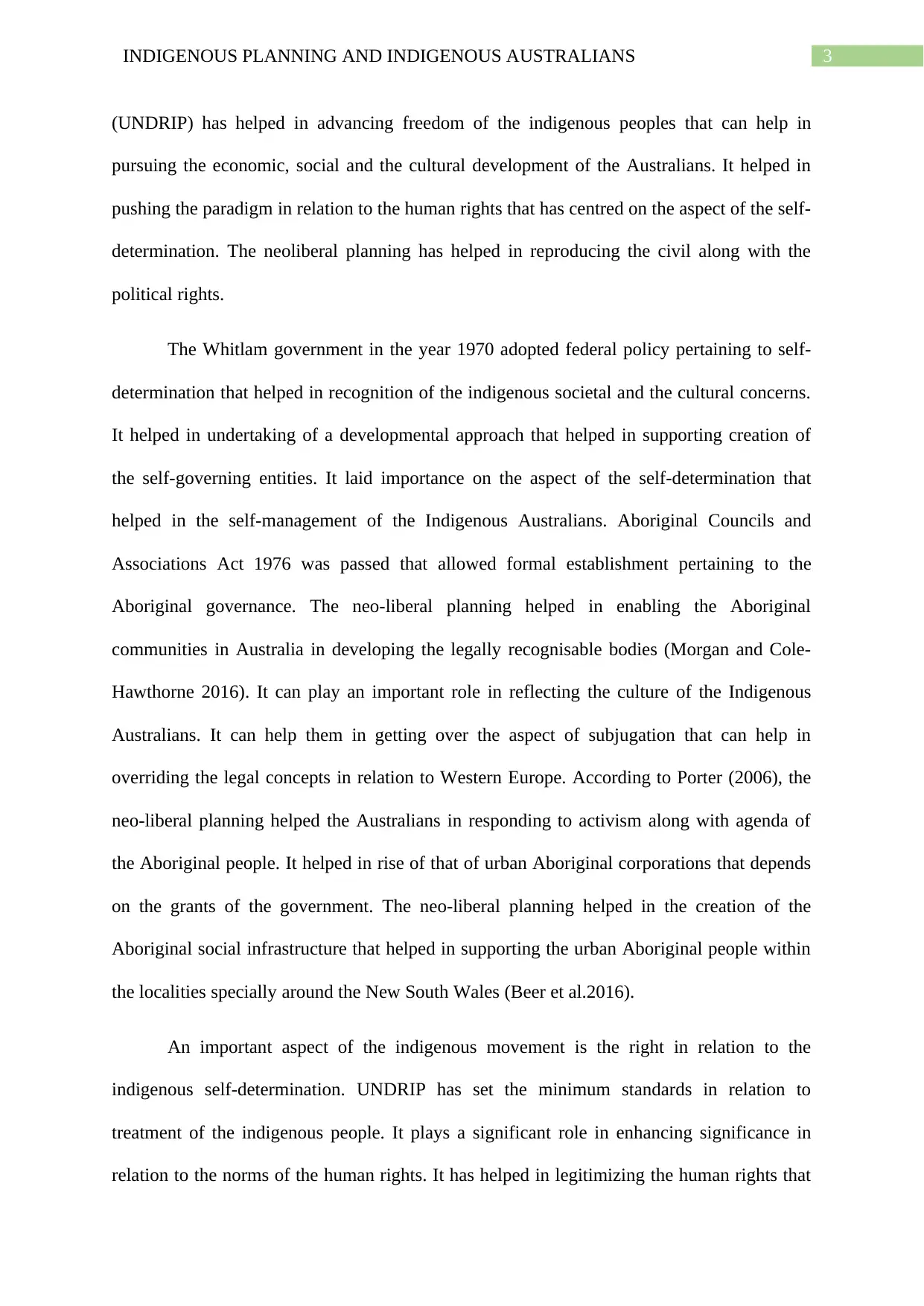
3INDIGENOUS PLANNING AND INDIGENOUS AUSTRALIANS
(UNDRIP) has helped in advancing freedom of the indigenous peoples that can help in
pursuing the economic, social and the cultural development of the Australians. It helped in
pushing the paradigm in relation to the human rights that has centred on the aspect of the self-
determination. The neoliberal planning has helped in reproducing the civil along with the
political rights.
The Whitlam government in the year 1970 adopted federal policy pertaining to self-
determination that helped in recognition of the indigenous societal and the cultural concerns.
It helped in undertaking of a developmental approach that helped in supporting creation of
the self-governing entities. It laid importance on the aspect of the self-determination that
helped in the self-management of the Indigenous Australians. Aboriginal Councils and
Associations Act 1976 was passed that allowed formal establishment pertaining to the
Aboriginal governance. The neo-liberal planning helped in enabling the Aboriginal
communities in Australia in developing the legally recognisable bodies (Morgan and Cole-
Hawthorne 2016). It can play an important role in reflecting the culture of the Indigenous
Australians. It can help them in getting over the aspect of subjugation that can help in
overriding the legal concepts in relation to Western Europe. According to Porter (2006), the
neo-liberal planning helped the Australians in responding to activism along with agenda of
the Aboriginal people. It helped in rise of that of urban Aboriginal corporations that depends
on the grants of the government. The neo-liberal planning helped in the creation of the
Aboriginal social infrastructure that helped in supporting the urban Aboriginal people within
the localities specially around the New South Wales (Beer et al.2016).
An important aspect of the indigenous movement is the right in relation to the
indigenous self-determination. UNDRIP has set the minimum standards in relation to
treatment of the indigenous people. It plays a significant role in enhancing significance in
relation to the norms of the human rights. It has helped in legitimizing the human rights that
(UNDRIP) has helped in advancing freedom of the indigenous peoples that can help in
pursuing the economic, social and the cultural development of the Australians. It helped in
pushing the paradigm in relation to the human rights that has centred on the aspect of the self-
determination. The neoliberal planning has helped in reproducing the civil along with the
political rights.
The Whitlam government in the year 1970 adopted federal policy pertaining to self-
determination that helped in recognition of the indigenous societal and the cultural concerns.
It helped in undertaking of a developmental approach that helped in supporting creation of
the self-governing entities. It laid importance on the aspect of the self-determination that
helped in the self-management of the Indigenous Australians. Aboriginal Councils and
Associations Act 1976 was passed that allowed formal establishment pertaining to the
Aboriginal governance. The neo-liberal planning helped in enabling the Aboriginal
communities in Australia in developing the legally recognisable bodies (Morgan and Cole-
Hawthorne 2016). It can play an important role in reflecting the culture of the Indigenous
Australians. It can help them in getting over the aspect of subjugation that can help in
overriding the legal concepts in relation to Western Europe. According to Porter (2006), the
neo-liberal planning helped the Australians in responding to activism along with agenda of
the Aboriginal people. It helped in rise of that of urban Aboriginal corporations that depends
on the grants of the government. The neo-liberal planning helped in the creation of the
Aboriginal social infrastructure that helped in supporting the urban Aboriginal people within
the localities specially around the New South Wales (Beer et al.2016).
An important aspect of the indigenous movement is the right in relation to the
indigenous self-determination. UNDRIP has set the minimum standards in relation to
treatment of the indigenous people. It plays a significant role in enhancing significance in
relation to the norms of the human rights. It has helped in legitimizing the human rights that
Paraphrase This Document
Need a fresh take? Get an instant paraphrase of this document with our AI Paraphraser
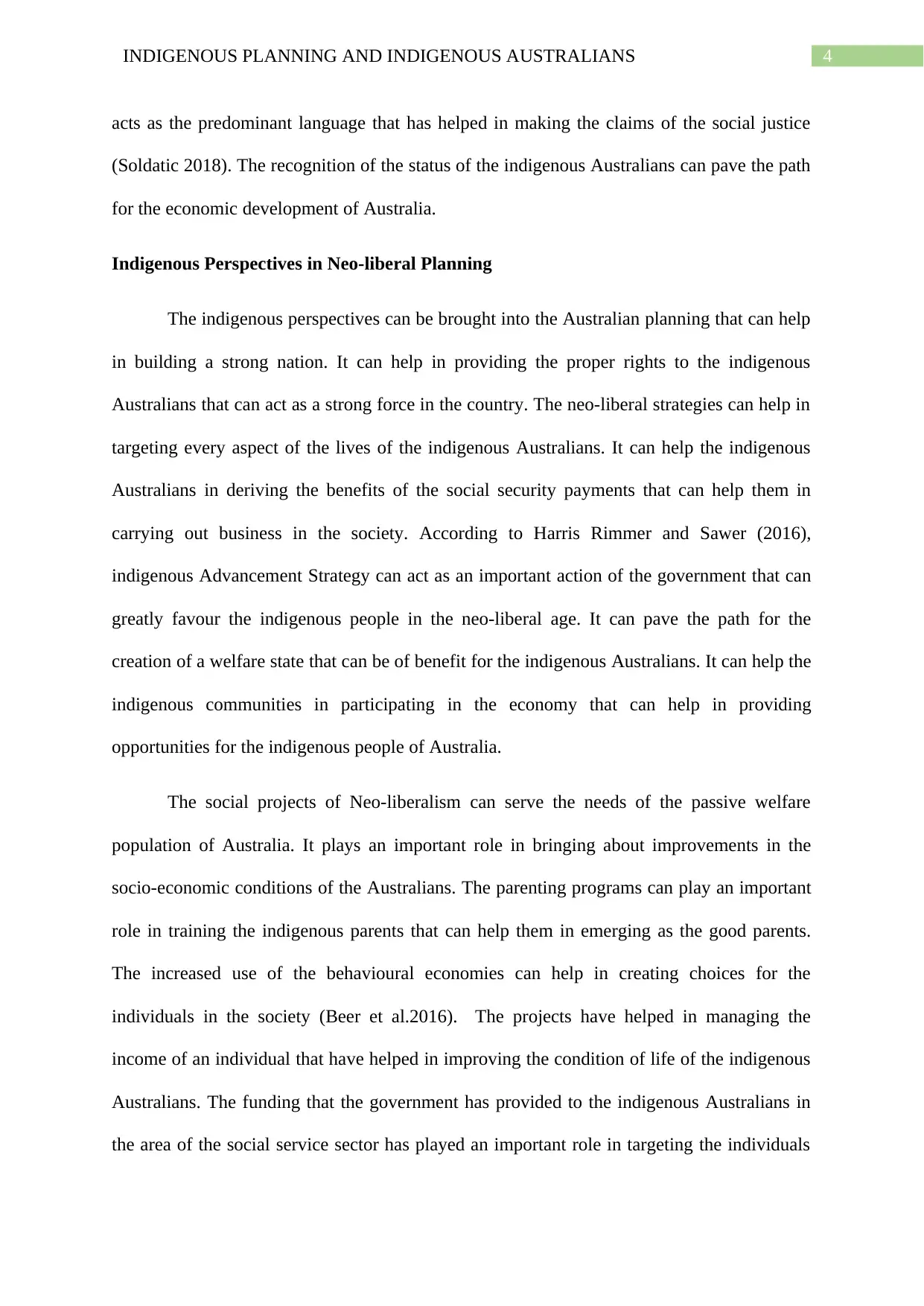
4INDIGENOUS PLANNING AND INDIGENOUS AUSTRALIANS
acts as the predominant language that has helped in making the claims of the social justice
(Soldatic 2018). The recognition of the status of the indigenous Australians can pave the path
for the economic development of Australia.
Indigenous Perspectives in Neo-liberal Planning
The indigenous perspectives can be brought into the Australian planning that can help
in building a strong nation. It can help in providing the proper rights to the indigenous
Australians that can act as a strong force in the country. The neo-liberal strategies can help in
targeting every aspect of the lives of the indigenous Australians. It can help the indigenous
Australians in deriving the benefits of the social security payments that can help them in
carrying out business in the society. According to Harris Rimmer and Sawer (2016),
indigenous Advancement Strategy can act as an important action of the government that can
greatly favour the indigenous people in the neo-liberal age. It can pave the path for the
creation of a welfare state that can be of benefit for the indigenous Australians. It can help the
indigenous communities in participating in the economy that can help in providing
opportunities for the indigenous people of Australia.
The social projects of Neo-liberalism can serve the needs of the passive welfare
population of Australia. It plays an important role in bringing about improvements in the
socio-economic conditions of the Australians. The parenting programs can play an important
role in training the indigenous parents that can help them in emerging as the good parents.
The increased use of the behavioural economies can help in creating choices for the
individuals in the society (Beer et al.2016). The projects have helped in managing the
income of an individual that have helped in improving the condition of life of the indigenous
Australians. The funding that the government has provided to the indigenous Australians in
the area of the social service sector has played an important role in targeting the individuals
acts as the predominant language that has helped in making the claims of the social justice
(Soldatic 2018). The recognition of the status of the indigenous Australians can pave the path
for the economic development of Australia.
Indigenous Perspectives in Neo-liberal Planning
The indigenous perspectives can be brought into the Australian planning that can help
in building a strong nation. It can help in providing the proper rights to the indigenous
Australians that can act as a strong force in the country. The neo-liberal strategies can help in
targeting every aspect of the lives of the indigenous Australians. It can help the indigenous
Australians in deriving the benefits of the social security payments that can help them in
carrying out business in the society. According to Harris Rimmer and Sawer (2016),
indigenous Advancement Strategy can act as an important action of the government that can
greatly favour the indigenous people in the neo-liberal age. It can pave the path for the
creation of a welfare state that can be of benefit for the indigenous Australians. It can help the
indigenous communities in participating in the economy that can help in providing
opportunities for the indigenous people of Australia.
The social projects of Neo-liberalism can serve the needs of the passive welfare
population of Australia. It plays an important role in bringing about improvements in the
socio-economic conditions of the Australians. The parenting programs can play an important
role in training the indigenous parents that can help them in emerging as the good parents.
The increased use of the behavioural economies can help in creating choices for the
individuals in the society (Beer et al.2016). The projects have helped in managing the
income of an individual that have helped in improving the condition of life of the indigenous
Australians. The funding that the government has provided to the indigenous Australians in
the area of the social service sector has played an important role in targeting the individuals
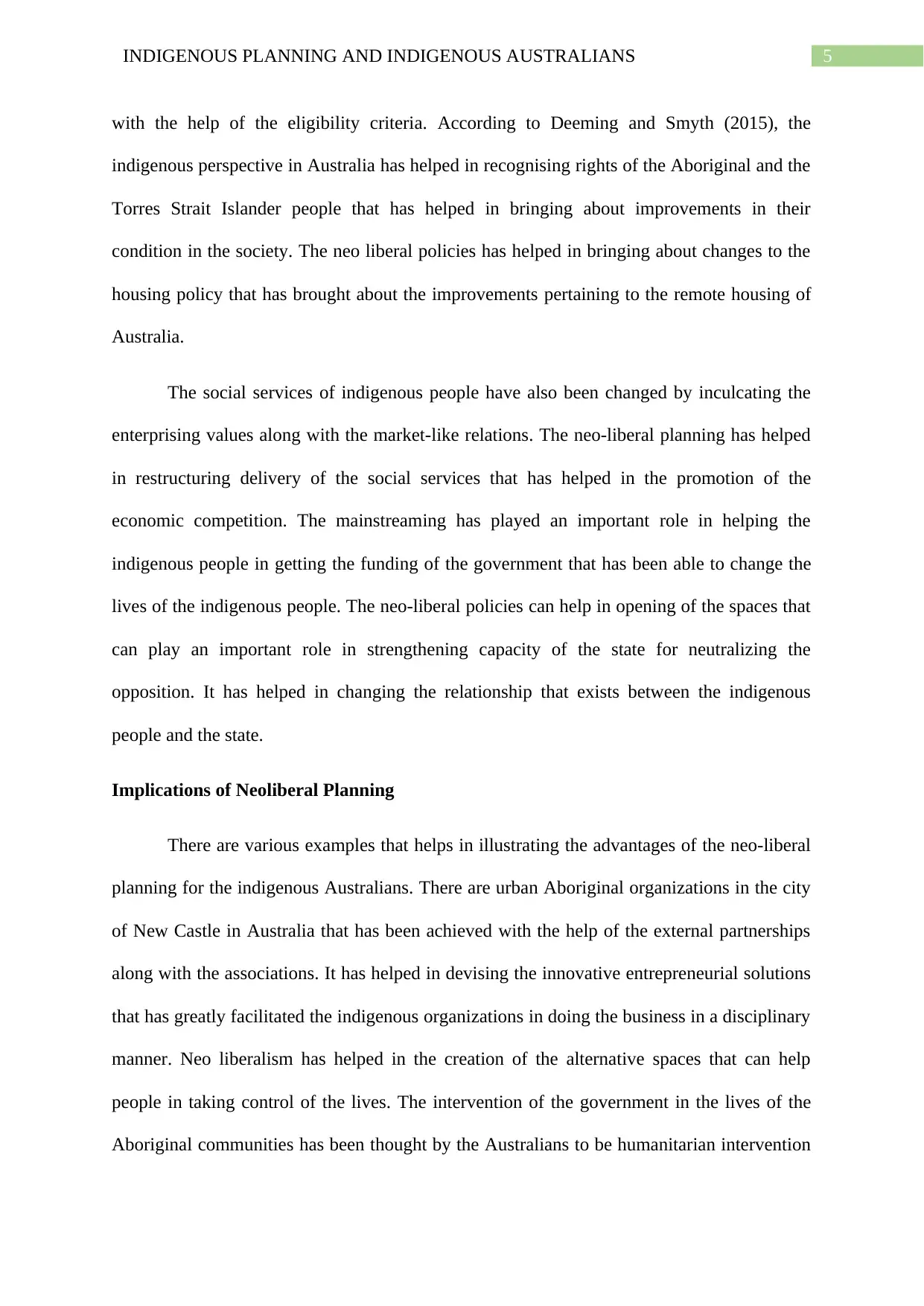
5INDIGENOUS PLANNING AND INDIGENOUS AUSTRALIANS
with the help of the eligibility criteria. According to Deeming and Smyth (2015), the
indigenous perspective in Australia has helped in recognising rights of the Aboriginal and the
Torres Strait Islander people that has helped in bringing about improvements in their
condition in the society. The neo liberal policies has helped in bringing about changes to the
housing policy that has brought about the improvements pertaining to the remote housing of
Australia.
The social services of indigenous people have also been changed by inculcating the
enterprising values along with the market-like relations. The neo-liberal planning has helped
in restructuring delivery of the social services that has helped in the promotion of the
economic competition. The mainstreaming has played an important role in helping the
indigenous people in getting the funding of the government that has been able to change the
lives of the indigenous people. The neo-liberal policies can help in opening of the spaces that
can play an important role in strengthening capacity of the state for neutralizing the
opposition. It has helped in changing the relationship that exists between the indigenous
people and the state.
Implications of Neoliberal Planning
There are various examples that helps in illustrating the advantages of the neo-liberal
planning for the indigenous Australians. There are urban Aboriginal organizations in the city
of New Castle in Australia that has been achieved with the help of the external partnerships
along with the associations. It has helped in devising the innovative entrepreneurial solutions
that has greatly facilitated the indigenous organizations in doing the business in a disciplinary
manner. Neo liberalism has helped in the creation of the alternative spaces that can help
people in taking control of the lives. The intervention of the government in the lives of the
Aboriginal communities has been thought by the Australians to be humanitarian intervention
with the help of the eligibility criteria. According to Deeming and Smyth (2015), the
indigenous perspective in Australia has helped in recognising rights of the Aboriginal and the
Torres Strait Islander people that has helped in bringing about improvements in their
condition in the society. The neo liberal policies has helped in bringing about changes to the
housing policy that has brought about the improvements pertaining to the remote housing of
Australia.
The social services of indigenous people have also been changed by inculcating the
enterprising values along with the market-like relations. The neo-liberal planning has helped
in restructuring delivery of the social services that has helped in the promotion of the
economic competition. The mainstreaming has played an important role in helping the
indigenous people in getting the funding of the government that has been able to change the
lives of the indigenous people. The neo-liberal policies can help in opening of the spaces that
can play an important role in strengthening capacity of the state for neutralizing the
opposition. It has helped in changing the relationship that exists between the indigenous
people and the state.
Implications of Neoliberal Planning
There are various examples that helps in illustrating the advantages of the neo-liberal
planning for the indigenous Australians. There are urban Aboriginal organizations in the city
of New Castle in Australia that has been achieved with the help of the external partnerships
along with the associations. It has helped in devising the innovative entrepreneurial solutions
that has greatly facilitated the indigenous organizations in doing the business in a disciplinary
manner. Neo liberalism has helped in the creation of the alternative spaces that can help
people in taking control of the lives. The intervention of the government in the lives of the
Aboriginal communities has been thought by the Australians to be humanitarian intervention
⊘ This is a preview!⊘
Do you want full access?
Subscribe today to unlock all pages.

Trusted by 1+ million students worldwide
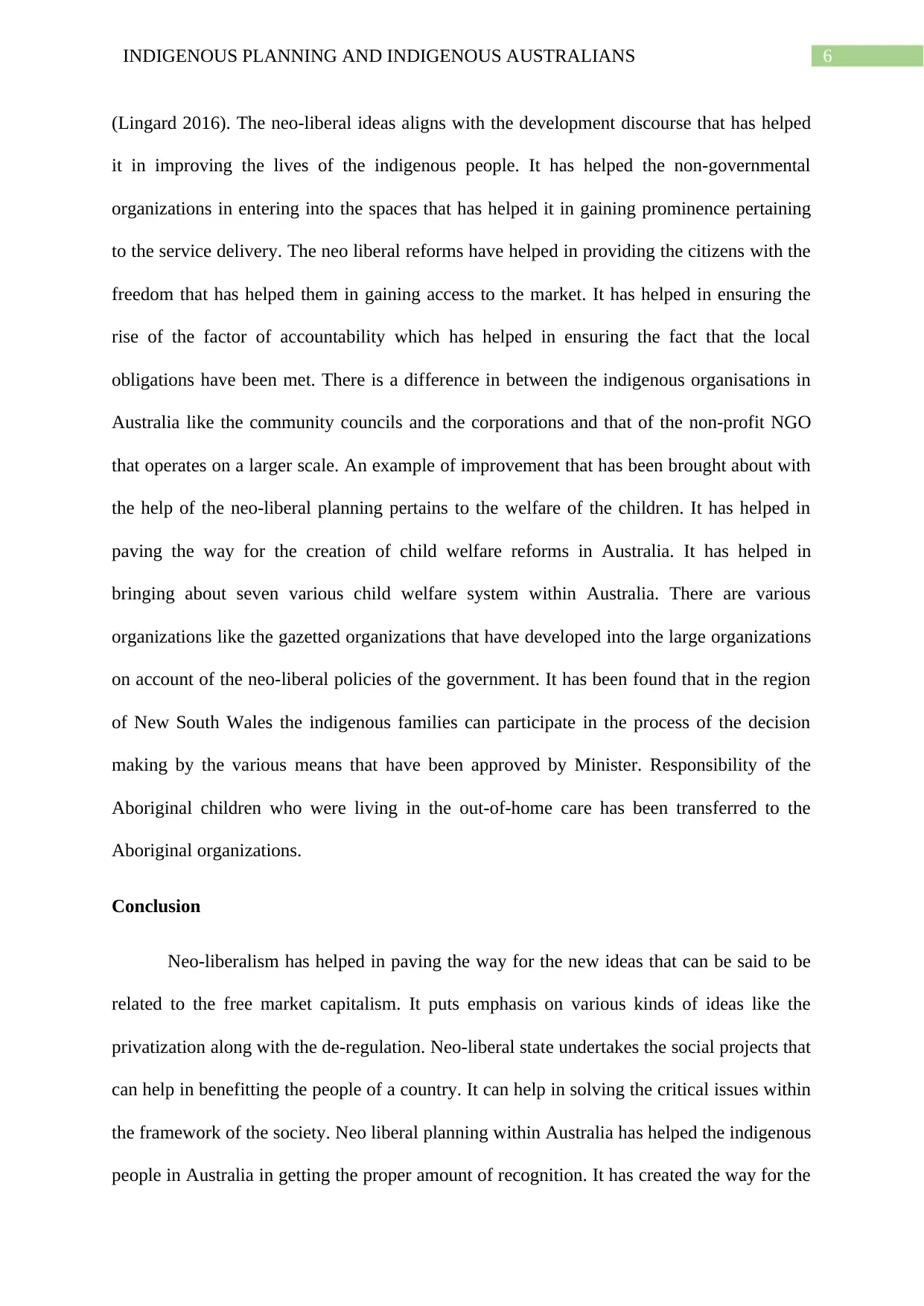
6INDIGENOUS PLANNING AND INDIGENOUS AUSTRALIANS
(Lingard 2016). The neo-liberal ideas aligns with the development discourse that has helped
it in improving the lives of the indigenous people. It has helped the non-governmental
organizations in entering into the spaces that has helped it in gaining prominence pertaining
to the service delivery. The neo liberal reforms have helped in providing the citizens with the
freedom that has helped them in gaining access to the market. It has helped in ensuring the
rise of the factor of accountability which has helped in ensuring the fact that the local
obligations have been met. There is a difference in between the indigenous organisations in
Australia like the community councils and the corporations and that of the non-profit NGO
that operates on a larger scale. An example of improvement that has been brought about with
the help of the neo-liberal planning pertains to the welfare of the children. It has helped in
paving the way for the creation of child welfare reforms in Australia. It has helped in
bringing about seven various child welfare system within Australia. There are various
organizations like the gazetted organizations that have developed into the large organizations
on account of the neo-liberal policies of the government. It has been found that in the region
of New South Wales the indigenous families can participate in the process of the decision
making by the various means that have been approved by Minister. Responsibility of the
Aboriginal children who were living in the out-of-home care has been transferred to the
Aboriginal organizations.
Conclusion
Neo-liberalism has helped in paving the way for the new ideas that can be said to be
related to the free market capitalism. It puts emphasis on various kinds of ideas like the
privatization along with the de-regulation. Neo-liberal state undertakes the social projects that
can help in benefitting the people of a country. It can help in solving the critical issues within
the framework of the society. Neo liberal planning within Australia has helped the indigenous
people in Australia in getting the proper amount of recognition. It has created the way for the
(Lingard 2016). The neo-liberal ideas aligns with the development discourse that has helped
it in improving the lives of the indigenous people. It has helped the non-governmental
organizations in entering into the spaces that has helped it in gaining prominence pertaining
to the service delivery. The neo liberal reforms have helped in providing the citizens with the
freedom that has helped them in gaining access to the market. It has helped in ensuring the
rise of the factor of accountability which has helped in ensuring the fact that the local
obligations have been met. There is a difference in between the indigenous organisations in
Australia like the community councils and the corporations and that of the non-profit NGO
that operates on a larger scale. An example of improvement that has been brought about with
the help of the neo-liberal planning pertains to the welfare of the children. It has helped in
paving the way for the creation of child welfare reforms in Australia. It has helped in
bringing about seven various child welfare system within Australia. There are various
organizations like the gazetted organizations that have developed into the large organizations
on account of the neo-liberal policies of the government. It has been found that in the region
of New South Wales the indigenous families can participate in the process of the decision
making by the various means that have been approved by Minister. Responsibility of the
Aboriginal children who were living in the out-of-home care has been transferred to the
Aboriginal organizations.
Conclusion
Neo-liberalism has helped in paving the way for the new ideas that can be said to be
related to the free market capitalism. It puts emphasis on various kinds of ideas like the
privatization along with the de-regulation. Neo-liberal state undertakes the social projects that
can help in benefitting the people of a country. It can help in solving the critical issues within
the framework of the society. Neo liberal planning within Australia has helped the indigenous
people in Australia in getting the proper amount of recognition. It has created the way for the
Paraphrase This Document
Need a fresh take? Get an instant paraphrase of this document with our AI Paraphraser
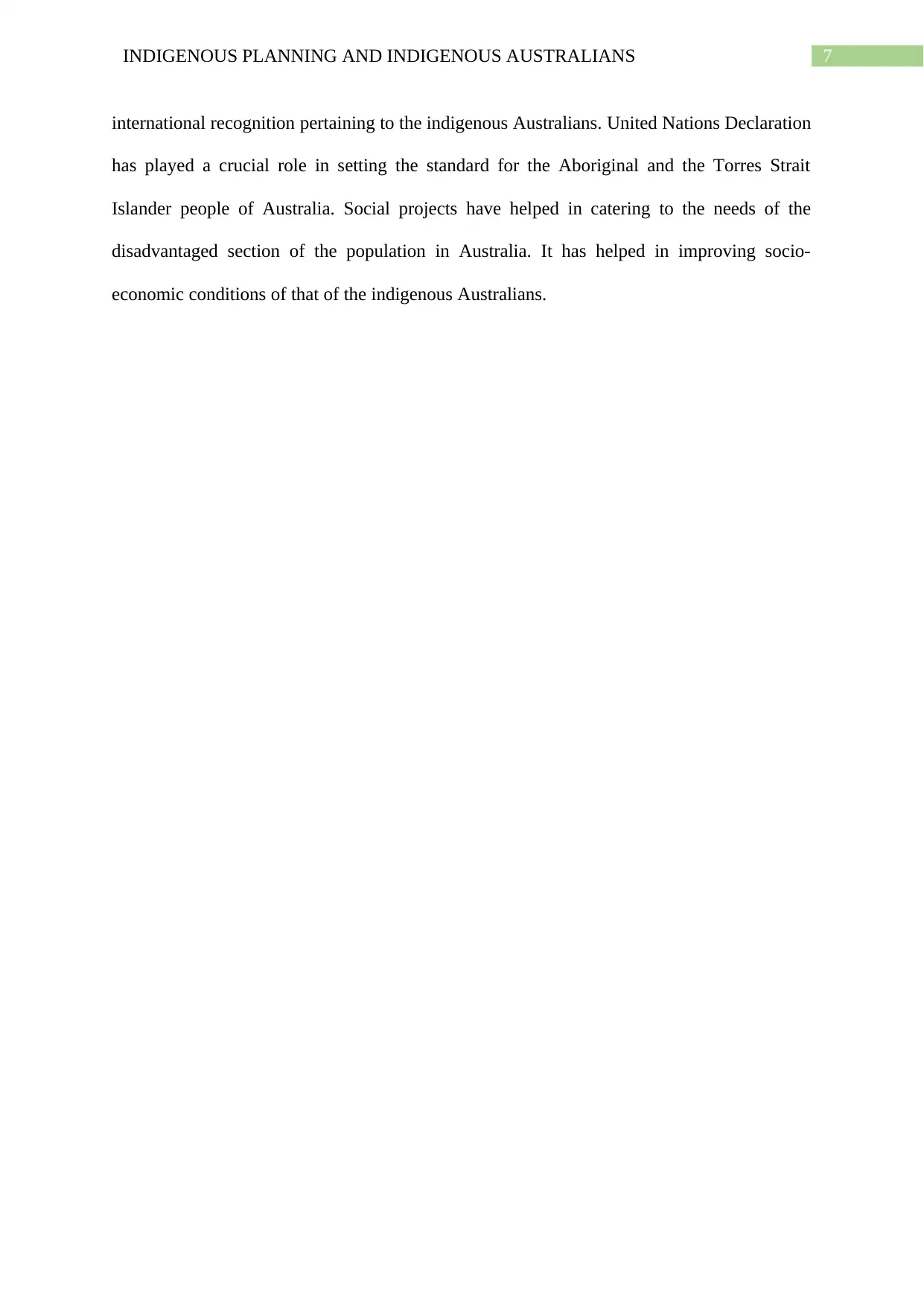
7INDIGENOUS PLANNING AND INDIGENOUS AUSTRALIANS
international recognition pertaining to the indigenous Australians. United Nations Declaration
has played a crucial role in setting the standard for the Aboriginal and the Torres Strait
Islander people of Australia. Social projects have helped in catering to the needs of the
disadvantaged section of the population in Australia. It has helped in improving socio-
economic conditions of that of the indigenous Australians.
international recognition pertaining to the indigenous Australians. United Nations Declaration
has played a crucial role in setting the standard for the Aboriginal and the Torres Strait
Islander people of Australia. Social projects have helped in catering to the needs of the
disadvantaged section of the population in Australia. It has helped in improving socio-
economic conditions of that of the indigenous Australians.
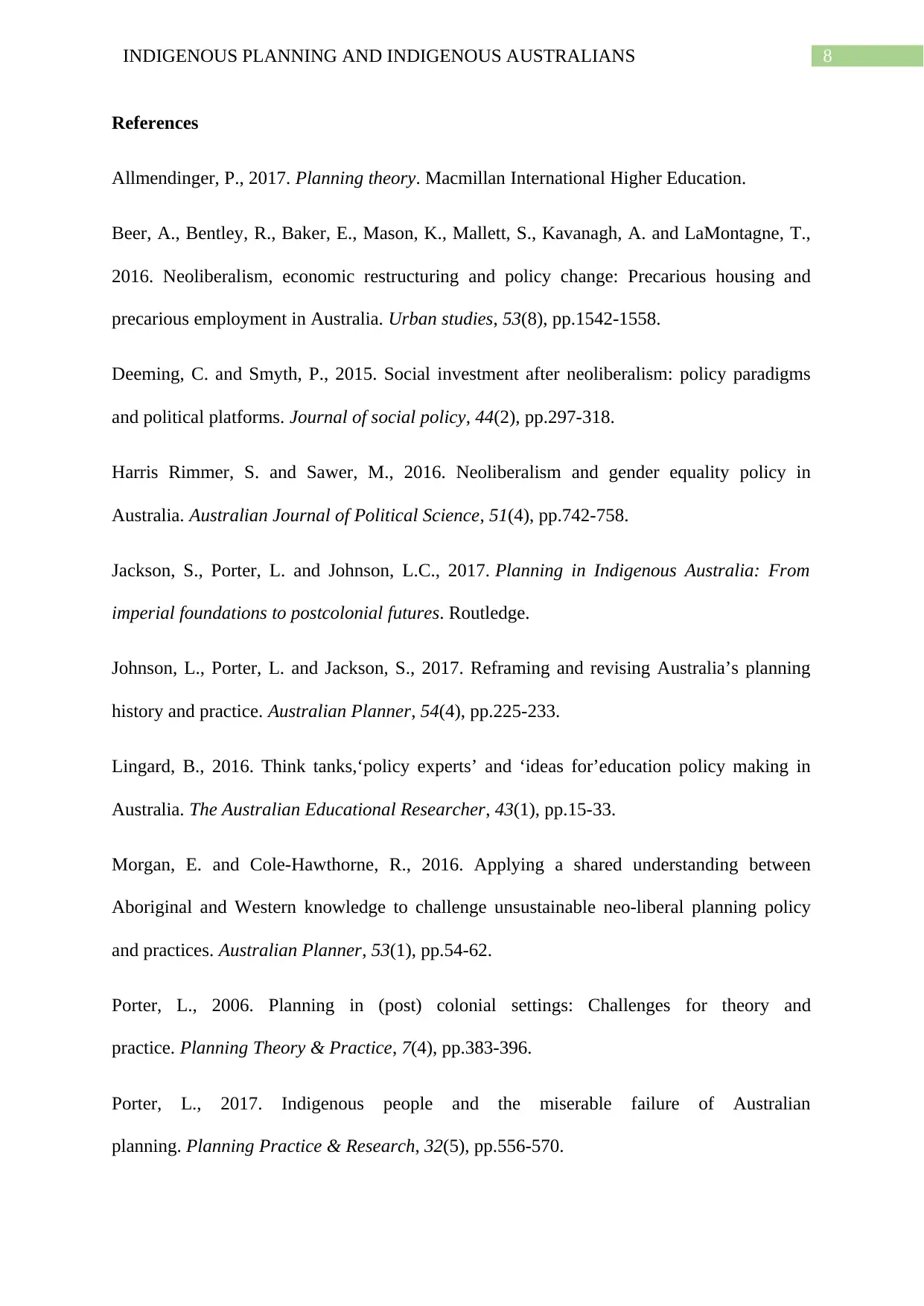
8INDIGENOUS PLANNING AND INDIGENOUS AUSTRALIANS
References
Allmendinger, P., 2017. Planning theory. Macmillan International Higher Education.
Beer, A., Bentley, R., Baker, E., Mason, K., Mallett, S., Kavanagh, A. and LaMontagne, T.,
2016. Neoliberalism, economic restructuring and policy change: Precarious housing and
precarious employment in Australia. Urban studies, 53(8), pp.1542-1558.
Deeming, C. and Smyth, P., 2015. Social investment after neoliberalism: policy paradigms
and political platforms. Journal of social policy, 44(2), pp.297-318.
Harris Rimmer, S. and Sawer, M., 2016. Neoliberalism and gender equality policy in
Australia. Australian Journal of Political Science, 51(4), pp.742-758.
Jackson, S., Porter, L. and Johnson, L.C., 2017. Planning in Indigenous Australia: From
imperial foundations to postcolonial futures. Routledge.
Johnson, L., Porter, L. and Jackson, S., 2017. Reframing and revising Australia’s planning
history and practice. Australian Planner, 54(4), pp.225-233.
Lingard, B., 2016. Think tanks,‘policy experts’ and ‘ideas for’education policy making in
Australia. The Australian Educational Researcher, 43(1), pp.15-33.
Morgan, E. and Cole-Hawthorne, R., 2016. Applying a shared understanding between
Aboriginal and Western knowledge to challenge unsustainable neo-liberal planning policy
and practices. Australian Planner, 53(1), pp.54-62.
Porter, L., 2006. Planning in (post) colonial settings: Challenges for theory and
practice. Planning Theory & Practice, 7(4), pp.383-396.
Porter, L., 2017. Indigenous people and the miserable failure of Australian
planning. Planning Practice & Research, 32(5), pp.556-570.
References
Allmendinger, P., 2017. Planning theory. Macmillan International Higher Education.
Beer, A., Bentley, R., Baker, E., Mason, K., Mallett, S., Kavanagh, A. and LaMontagne, T.,
2016. Neoliberalism, economic restructuring and policy change: Precarious housing and
precarious employment in Australia. Urban studies, 53(8), pp.1542-1558.
Deeming, C. and Smyth, P., 2015. Social investment after neoliberalism: policy paradigms
and political platforms. Journal of social policy, 44(2), pp.297-318.
Harris Rimmer, S. and Sawer, M., 2016. Neoliberalism and gender equality policy in
Australia. Australian Journal of Political Science, 51(4), pp.742-758.
Jackson, S., Porter, L. and Johnson, L.C., 2017. Planning in Indigenous Australia: From
imperial foundations to postcolonial futures. Routledge.
Johnson, L., Porter, L. and Jackson, S., 2017. Reframing and revising Australia’s planning
history and practice. Australian Planner, 54(4), pp.225-233.
Lingard, B., 2016. Think tanks,‘policy experts’ and ‘ideas for’education policy making in
Australia. The Australian Educational Researcher, 43(1), pp.15-33.
Morgan, E. and Cole-Hawthorne, R., 2016. Applying a shared understanding between
Aboriginal and Western knowledge to challenge unsustainable neo-liberal planning policy
and practices. Australian Planner, 53(1), pp.54-62.
Porter, L., 2006. Planning in (post) colonial settings: Challenges for theory and
practice. Planning Theory & Practice, 7(4), pp.383-396.
Porter, L., 2017. Indigenous people and the miserable failure of Australian
planning. Planning Practice & Research, 32(5), pp.556-570.
⊘ This is a preview!⊘
Do you want full access?
Subscribe today to unlock all pages.

Trusted by 1+ million students worldwide
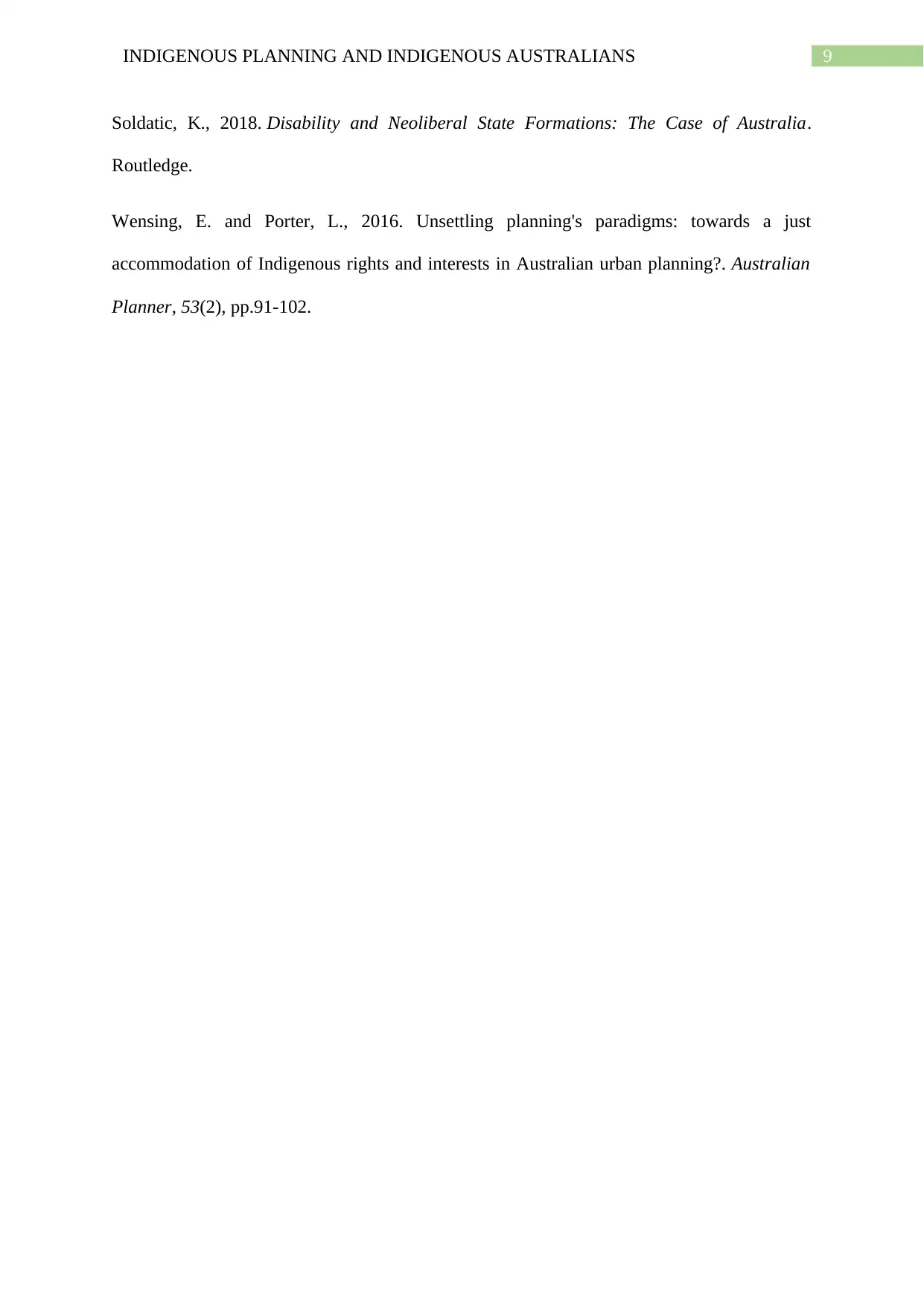
9INDIGENOUS PLANNING AND INDIGENOUS AUSTRALIANS
Soldatic, K., 2018. Disability and Neoliberal State Formations: The Case of Australia.
Routledge.
Wensing, E. and Porter, L., 2016. Unsettling planning's paradigms: towards a just
accommodation of Indigenous rights and interests in Australian urban planning?. Australian
Planner, 53(2), pp.91-102.
Soldatic, K., 2018. Disability and Neoliberal State Formations: The Case of Australia.
Routledge.
Wensing, E. and Porter, L., 2016. Unsettling planning's paradigms: towards a just
accommodation of Indigenous rights and interests in Australian urban planning?. Australian
Planner, 53(2), pp.91-102.
1 out of 10
Related Documents
Your All-in-One AI-Powered Toolkit for Academic Success.
+13062052269
info@desklib.com
Available 24*7 on WhatsApp / Email
![[object Object]](/_next/static/media/star-bottom.7253800d.svg)
Unlock your academic potential
Copyright © 2020–2026 A2Z Services. All Rights Reserved. Developed and managed by ZUCOL.





